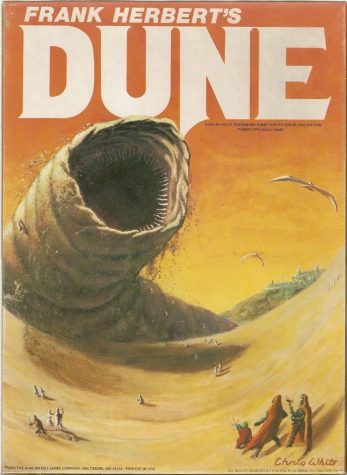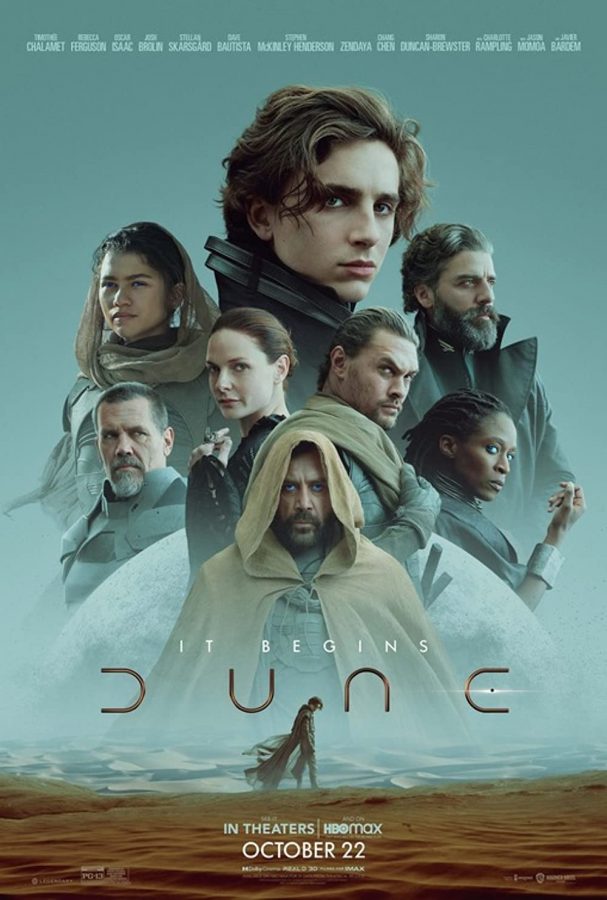Dune: Aesthetic but Disappointing
Despite troubling themes of colonialism and underlying xenophobia, Frank Herbert’s Dune remains a classic of science fiction. A few attempts have been made to adapt it to the screen, all misfiring almost comically, but with Denis Villeneuve — director of much celebrated recent sci-fi films such as Arrival and Blade Runner 2049 — heading the project, this 2021 version has undeniable promise. However, although passably well executed as a standalone film, Dune has some fatal flaws keeping it from doing justice to its source material.
It can be said without a doubt that this movie is at very least stylish. Its aesthetics are consistent and elegant, and the soundtrack and overall sound design stand out as a highlight. However, this adaptation strips it of its vibrancy and vitality; what David Lynch’s 1984 version had in camp, color, and bizarre costuming choices is replaced with dull scenery, blandly styled clothing, and a well animated but ultimately uninspired sand worm design. The idea of an expensive drug with extraordinary powers, referred to as “spice” in clear reference to the spice trade of antiquity and the medieval period, brings to mind an opulence and extravagance not at all reflected.
Even its star-studded cast leaves something to be desired in the way of originality. A few big name actors can do a lot for a movie’s viewership, but Dune (2021) acts like an animated music movie trying to pack as many pop star cameos as it can fit into a 1.5 hour runtime; it makes it clear that it is prioritizing immediate popularity over a product that will hold up past the span of current celebrity infatuation.
Furthermore, very few of the characters are used in a satisfying way. Broadly, the concept of the movie is that Paul Atreides (Timothée Chalamet), the son of a powerful lord in the Dune universe, moves with his family to the planet of Arrakis. Arrakis is a desert planet previously controlled by rival family House Harkonnen, valued only for its deposits of the powerful psychedelic “melange” or “spice,” often to the detriment of the local population. As the Harkonnens’ true motives become clear, Paul increasingly comes into his role as the Kwisatz Haderach, a prophesied messiah figure.
Paul is well-acted, as is the swordmaster Duncan Idaho (Jason Momoa), whose portrayal breathes a life into him which he lacked in the book. However, the list more or less ends here. Characters like Dr. Yueh (Chang Chen) and Duke Leto Atreides (Oscar Isaac) are underdeveloped in their personalities and motivations, making their deaths feel empty. The original Lady Jessica drops off in interest after the first few chapters, and seemingly in an attempt to remedy this, the writers of Dune (2021) give her more time on screen without meaningfully elaborating on her character. Rebecca Ferguson does as good a job as is possible, but the way Jessica is written is simply not conducive to an interesting presence.
On the other hand, Baron Harkonnen (Stellan Skarsgard) is extremely underused. Despite the amount of screen time devoted to establishing him as the grotesque face of looming evil, auguring further depiction in later instalments, none of his personality comes through. Baron Harkonnen in the book is not a compelling villain just because of the winning combination of ugliness and power; he makes himself a worthy opponent to an increasingly all-powerful Paul through his intellect and manipulation.
Of course, it’s not feasible for all of this to come through in one film. Already, most of its almost three hour runtime is devoted to exposition. To its credit, it parcels out information well, avoiding overly cumbersome bouts of expository monologuing, with the exception of the somewhat clichéd opening narration. It largely manages to get across information by showing rather than explaining, or through conversations that develop characters; however, the issue remains that there is simply too much lore needed to understand the plot to achieve a well-paced film.
Dune attempts to offset this with exciting combat sequences. Especially as the movie goes on, it feels like the writers have decided that every slower, information-heavy scene must be immediately countered with some kind of action, to the point where by the last hour, your ears have started to tune out every dramatic musical cue; this is just the constant backdrop. This wouldn’t be such a problem if the fighting stood out a bit more, but after you’ve watched your third self-sacrificial death in as many hours, the novelty begins to wear a little thin. At its core, the difficulty is that Dune is primarily political intrigue and the creators are trying to warp it into a thrilling action movie to appease the modern viewer. Where it allows itself to slow down, it’s at its best; but trying to balance everything it’s trying to do at once, it really only has the time to get through the very opening of the overarching plot.

Still, all of these issues are trivial next to the greatest problem, which is in timing of this movie’s release: fundamentally, this story is an outdated and racist one, and no adaptation can change that. The clearly Arab “Fremen” are depicted as helplessly waiting for a white savior for hundreds of years, and when they do finally gain the upper hand, they are uncontrollably violent. Holding Dune up to the modern eye can only detract from its value. Although a useful allegory in 1965, the world has moved past its need for it as anything more than a particularly interesting relic.
Dune will likely remain a story read and loved by many for the foreseeable future, and if you are looking for a thought-provoking piece of media to spend a few hours on, Villeneuve’s adaptation can be enjoyed by long time fans and those unfamiliar with the original work alike. However, I don’t see it becoming the kind of long-form adaptation to remain in the public eye à la Peter Jackson’s Lord of the Rings trilogy for more than a few years, which seems to be how it would hope to present itself. The sequel has a strong chance of redeeming it, so there is still hope; but more likely, the next decade will see the saga fade once more into oblivion.
Once Tatler’s least prolific writer, Eliot now contents himself with a calling that lends itself better to procrastination. He also co-edits IMAGO, Lakeside’s...

